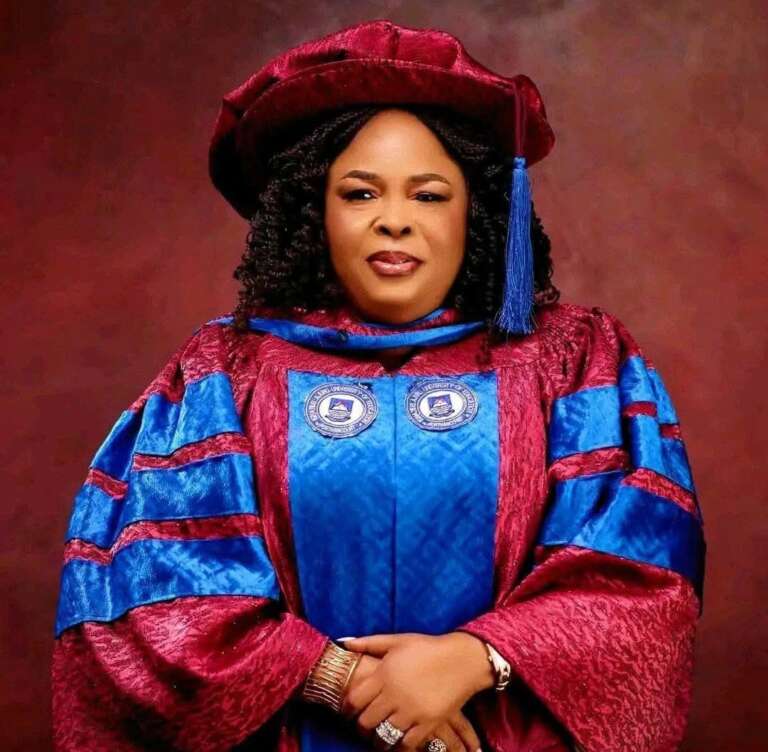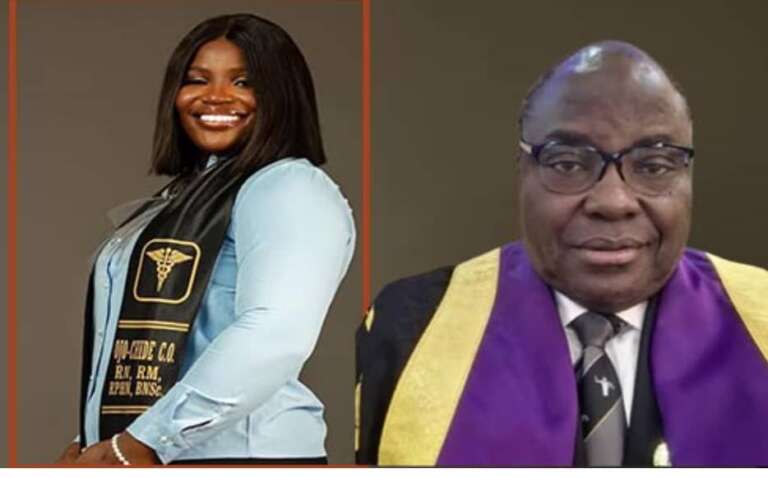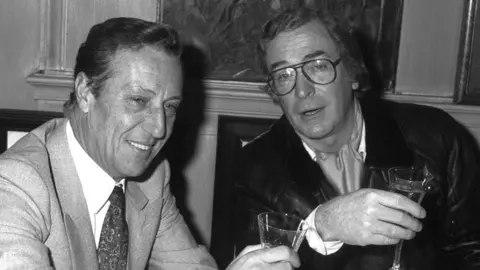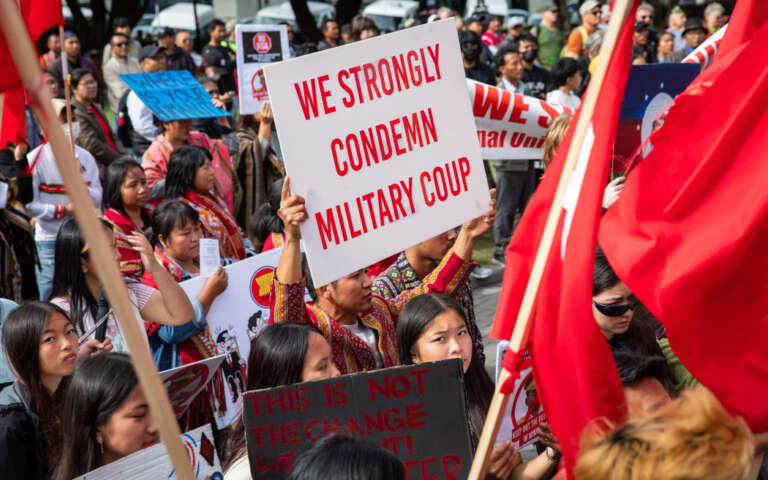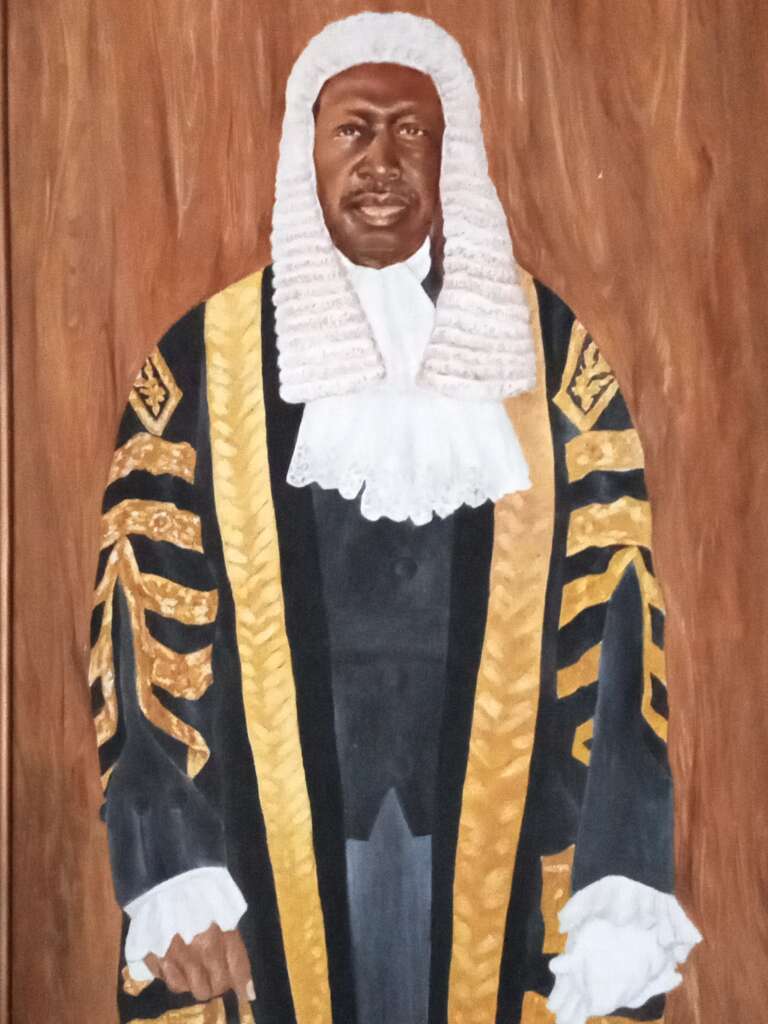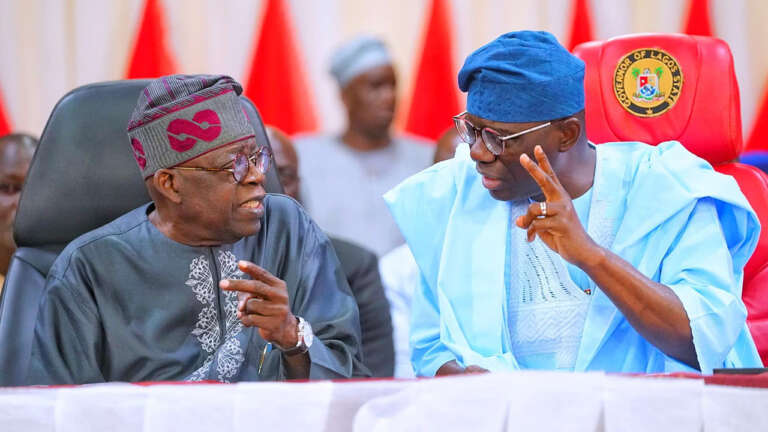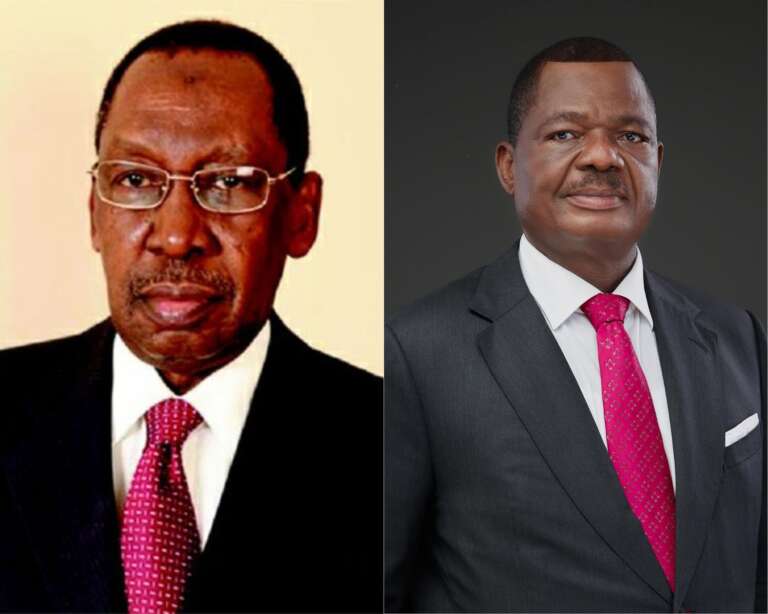On the 24th December, 1942, my father, Malam Abdullahi Uwaisu, died. I was six years old. He was an employee of the Nigerian Railway Department, as the Nigerian Railway Corporation was then known. It fell on my late mother, Hajia Hajara to bring me up singlehandedly together with my sister Hajiya Asamau and half-brother Alhaji Shehu Abubakar.
As God would have it, my mother remarried two years later to a school Headmaster, Malam Muhammadu Jumare. He it was that suggested that I should enrol in the Native Authority Elementary School, Kaduna, where he was teaching. My mother agreed and so I started my education there. However, after the first year at the school, my step-father was transferred in 1946 to Tudun Wada Elementary School Zaria.
I too had to transfer to the school. But as there were only two classrooms in the School, there were by that year only classes 1 and 3, I therefore could not join class 3 since I did not pass through class 2. For that reason I had to repeat class 1. I shared this school, amongst others, with Alhaji Rilwan Lukman, former Adviser to the President on Petroleum and Energy who was in class 3.
In 1950, I got admitted into Zaria Middle School where I had 2 years stint before I got admitted into Barewa College, Zaria. This was an elitist School. While educations in the two previous schools were free, fees were paid at Barewa College. In those days it was 12 Nigerian Pounds per annum. My Mother who by this time had got separated from my step father would have to struggle through trading to meet the responsibility. This she did with little or no help from anyone except the monthly rent that she collected from the house my late father left for us.
In 1956, the Northern Nigeria Government headed by the late Sir Ahmadu Bello, the Sardauna of Sokoto, took a decision to grant to all the students in Barewa College scholarship, thus making education in the school free like in the Elementary and the Middle School. Not only that, it was decided to return to the students’ parent all the fees paid from 1952 to 1956. The sum of 48 pounds was refunded to my mother who asked me to mention what I would like her to buy for me from the amount as a present. I chose a bicycle whose price was 8 pounds then. It was “Robin Hood’ brand. By this act, I became the first student in my class to possess a bicycle. This was a source of pride for me.
From Form 3 in Barewa College, I was able to obtain holiday jobs during the school’s vacation periods, the longest being 3 months to enable the expatriate teachers return to United Kingdom during summer for their leave. I secured temporary jobs at various times with Paterson Zochonis Ltd (PZ), the Veterinary Department of Zaria Native Authority and the United African Company Lid. (UAC). The salaries I earned from the jobs made me one of the richest amongst the students in my class. However this did not spoil me because my beloved mother kept on warning me to remember that I was an orphan and that I must behave myself and study hard. She was a stern disciplinarian who would not spare the rod.
While at Barewa College, before I completed my education, I developed interest in studying law. This came about by chance. I got encouragement from the legal practitioners then practicing in Zaria without their intending or knowing it.
These were the late Mr. Noel Grey,Kenneth Grey, who lives and practices in Kano, the late Hon. Justice Beckley of Lagos State High Court, the late Mr. Sawyer, from Lokoja and lately Alhaji A.G.F Razak, SAN. So on completing Form 6, in 1957, I applied for a Northern Nigeria Government scholarship to study law in the United Kingdom. I was invited in 1958 by the Northern Nigeria Scholarship Board for interview but somehow the telegram containing the invitation got to me late and so I missed the interview for that year. This was what made me to resign my appointments as Accounts Clerk with the Nigerian Tobacco Company Ltd. in Zaria early in 1959 to take up a civil service appointment as Publicity Assistant, in the Ministry of Information in Kaduna, in order to ensure that I did not miss the next interview in 1959 for which I applied.
After the interview took place, I was successful but there was still one hurdle to jump. There were other successful candidates. The government practice then was that the Ministry of Finance would have to approve the number of students who succeeded at the interview that would be granted scholarship particularly to travel abroad for studies.
Again, luck was against me and I was dropped. This was an inside information that was divulged to me by a relation that was a confidential secretary in the Ministry at the material time. I resigned to my fate. However, as luck would have it, soon after, the Government of Northern Nigeria decided about the same time in 1959 to have a crash-programme for training matured students to become lawyers for the purpose of being employed as the Magistrates and State Counsel in addition to training younger people on scholarship as lawyers.
The training was to take place initially at the Institute of Administration Zaria which later became a part of the Ahmadu Bello University, Zaria. Under a special arrangement with the Inns of Court in London, the students were to take Part I of the Bar Examination at the Institute and if successful to proceed to London to complete the course by taking Part II of the Examinations. The 1959 Programme was advertised in the newspapers and I applied as a civil servant. I was not even invited for the interview.
Amongst those successful were Hon. Justice Saidu Kawu and Hon. Justice A.B Wali who both became Justices of the Supreme Court. In the meanwhile, I was transferred to Kano where I worked with late Alhaji Muhammadu Dungus, who was a Senior Information Officer. When the second advertisement for the training in 1960 was advertised I was reluctant to apply. It was him that encouraged me to do so. By that time I had got married to my first wife Saratu in January,1960. As luck would have it, I was this time around called for the interview and later selected for the training. I received a telegram to that effect. My happiness was without limit, I so valued that telegram that I am still in possession and keeping custody of it. Twelve of us were admitted to the course in July 1960.
Those who succeeded too have been called to the English Bar with me are Hon. Justice M. M. A. Akanbi, CFR who was President of the Court of Appeal and the immediate past Chairman of the Independent Corrupt Practices and Related Oftences Commission (ICPC), late Hon. Justice Shebu Usman Mohammed, who was Chief Judge of Kaduna State and later Justice of the Supreme Court of Nigeria for a short period before his death in February 1993, late Hon. Justice Umaru Maidama, who was a Justice of the Court of Appeal, late Hon. Justice Anthony Aina Ekundayo, who was a Judge of the High Court of Kwara State, and late Hon. Justice Adamu Minijibir of the High Court of Kano State. Of the class of 12 nine of us got to England and only six of us got to be called to the English and Nigerian Bar. And of the same number (12), only Hon. Justice Akanbi and myself today remain alive. I am the last to relinquish public service by retiring today. Alhamdu Lillahi (Thanks be to Allah).
On completing my training and called to Bar, I was transferred from the Ministry of information of the Northem Nigeria to the Ministry of Justice as a Pupil State Counsel. I rose through the ranks to become Solicitor General and Permanent Secretary. I served in the State Counsel Chambers in Jos and the Headquarters in Kaduna. I travelled extensively to prosecute criminal and defend civil cases in Jos, Bauchi, Yola, Mubi, Maiduguri, Makurdi, Lokoja, Ilorin, Minna, Zaria which are provincial Headquarters then.
I served under the late Hon. Justice Mohammed Bello, GCON, my immediate predecessor-in-office as Chiel Justice of Nigeria, when he was the Director of Public Prosecutions (D.P.P) of Northem Nigeria. After the coup d’état of 1966, he was succeeded as D.P.P by Hon. Justice Mamman Nasir, GCON, former President of the Cour of Appeal. That was what brought us together up to 1968, when the civil servants of former Northern Nigeria were deployed to the 12 States created by General Yakubu Gowon. I found myself, together with Hon. Justice Nasir and Hon. Justice Umaru Abdullahi, CON, President of the Court of Appeal and others deployed to the Ministry of Justice of North-Central State as its nucleus officers. Hon. Justice Nasir became the Solicitor-General whilst I was his number two as Senior State Counsel. The years 1968 to 1972 saw him and myself working together at very close quarters. During those years I rose to the rank of Principal State Counsel and Solicitor-General. My appointment to the last post did not come about easily.
In 1969, Hon. Justice Mamman Nasir was appointed the first Attorney-General and Commissioner for Justice of the North-Central State. I did not immediately succeed him as Solicitor General. I remained Principal State Counsel until 1971. An incident happened in 1970 when he proposed in the Estimate of the State for the creation of the Office of Solicitor-General, so that I could be promoted to it. While the State Executive Council was considering the proposal, some unfavorable remarks were made against me by the incumbent Military Governor of the State. Hon. Justice Nasir, who was a member of the Executive Council, put up a defence on my behalf. The debate between him and the Governor got heated and Hon. Justice Nasir at one stage threatened to resign his office of Attorney-General.
The incident was leaked to me and knowing how hard I had been working for the State without promotion, I threatened to resign my appointment. It was Hon. Justice Nasir who prevailed on me not to do so, since the Ministry would collapse if both of us left at the same time. Common sense and reason prevailed, the proposal in the Estimate was accepted and immediately the Budget was passed, Hon. Justice Nasir put up a recommendation to the State Civil Service Commission for my promotion and that was how I became the Solicitor-General.
In 1972, I was asked by the Chief Justice of Northern Nigeria, the late Sir Nigel Reed after consultation with Hon. Justice Mamman Nasir, as Attorney-General of North-Central State, whether I would like to go to the North-Eastern State as an Acting Judge of the High Court of that State, in order to help clear the backlog of murder cases in the State, which had then only one High Court Judge in acting capacity. I was then 36 years old. I did not want to go to the Bench then as my ambition was to do so at the age of 45. I was, at that time, enjoying appearing in the Supreme Court and the High Court as counsel. The proposal was not attractive to me even if it was to last for 6 months only as suggested by Sir Nigel Reed, Hon. Justice Mamman Nasir persisted that I should not turn down the invitation since it was a great honor and recognition of my capability. So I accepted the bait and ever since I was not allowed to return to the Ministry of Justice and the Bar which I loved, I remained on the Bench until today.
When late General Murtala Mohammed, a classmate, school housemate of mine at Barewa College, staged a coup d’état in 1975, a Chief Justice (now Chief Judge) was to be appointed for old Kaduna State as the North-Central State later came to be known. Three Judges were to be appointed for the State, we were Hon. Justice A.W.E. Wheeler, late Hon. Justice Shehu Usman Mohammed and myself. Since Hon. Justice Wheeler was senior to both of us and was in fact our training officer in the erstwhile Ministry of Justice of Northem Nigeria, he was proposed for the post of Chief Justice. The Military Governor of the State would rather have an indigene and so nominated me for the office. I had to turn his choice down because my sense of fairness would not allow me to accept the office. And so Hon. Justice Wheeler became the first Chief Justice of Kaduna State. When he went on his 3 months annual leave in May 1976, I was made Acting Chief Justice of the State in his absence.
When the Federal Court of Appeal was created on 1st October of that year. I was the choice of Hon. Justice Arthur Wheeler for appointment to it. However, I was not keen because I did not fancy being posted to all its divisions, which were the 5 regional headquarters of the former Regional Governments of Nigeria. What influenced my mind was the condition of my sick stricken mother in Zaria and the construction of a house which was going on in Kaduna with a loan from the Nigerian Building Society. Nevertheless, I found myself and Hon. Justice Mustapha Akanbi, together with others, appointed to the Court on 1st January, 1977.
Luckily and due to the influence of Hon. Justice Mamman Nasir, who had earlier in November, 1976, became a Justice of the Court, I found myself, with him and late Hon. Justice S. J. Ete, deployed to the branch of the Court in Kaduna. Early in 1978, Hon. Justice D.O. Ibekwe, who was the first President of the Court of Appeal, died. He was succeeded by Hon. Justice Mamman Nasir, who moved to Lagos. Hence, I became the second Presiding Justice of the Court in Kaduna. Hon. Justice Adenekan Ademola, OFR took the place of Hon. Justice Nasir. I variously sat in the Divisions of the Federal Court of Appeal at Lagos, Ibadan and Benin but not Enugu before I was appointed to the Supreme Court on 15th August, 1979, together with late Hon. Justice Augustine Nnamani, JSC.
I was not very happy about the appointment because it was going to take me further away from my sick mother who would not like to leave Zaria or live with me wherever I might be. She too was vehemently against me accepting the appointment. I therefore went to late Sir Darnley Alexander to protest the appointment and lack of consultation with me before it was made. His response to me was that it was too late for me to protest since the appointment had been announced to the whole world and that it was never the practice anywhere, for an officer who was to be promoted to be consulted before being so elevated. I therefore had no choice but to accept my fate. As for my mother, she would have none of it. I had to rely on my maternal uncle, the late Sarkin Auchan, Alhaji Zakari Ya’u, who was her younger brother to prevail on her.
Reluctantly though she gave her blessing after I promised that I would travel to Zaria at the end of every month to see her. So it had been until she died in Zaria on the 20th January 1990, when l happened to be there for the award of honorary degree to late Hon. Justice Mohammed Bello, JSC, GCON, Chief Justice of Nigeria by the Ahmadu Bello University. This gave me opportunity to participate in her funeral. May her soul rest in peace and may Allah (SWT) grant her Aljanah (Paradise). Amen.
Alas, she was not destined to see me become the Chief Justice of Nigeria and thereby observe crowning of the fruits of her labour.
I was appointed as the Chief Justice of Nigeria on 19th December, 1995, after being a Justice of the Supreme Court for 16 years. While being sworn-in on the same day at the State House, Abuja, the Head of State, late Sani Abacha, GCON, in his speech stated as follows:-
“The ceremony which you have just witnessed marks the beginning of a new chapter in the judicial history of our great country. Hon. Justice Mohammed Lawal Uwais, by his appointment as Chief Justice of Nigeria has assumed leadership of the judiciary after 16 years as Justice of the Supreme Court of Nigeria.
The choice of a successor to Hon. Justice Mohammed Bello, as Chief Justice of Nigeria was a painstaking task. Government was mindful of the seniority of the serving members of the Supreme Court and was determined to ensure that the most senior justice of the Supreme Court took over from Honorable Justice Bello after retirement.
Happily, Justice Bello’s successors as we have seen, is no less a legal giant. Justice Mohammed Lawal Uwais’ training, experience and intellectual capacity have adequately prepared him for the exalted office of the Chief Justice of Nigeria.
His rich professional background explains the high expectation engendered by his appointment, especially at this critical time in our history. We expect Justice Uwais will bring his vast experience, maturity and foresight to bear on the judiciary”.
Since my appointment as a Justice of the Supreme Court in 1979, I had the luck to work under no less than 5 Chief Justices of Nigeria. They are Sir Darnley Alexander, GCON, Hon. Justice Atanda Fatayi-Williams GCON, Hon. Justice George Sodeinde Sowemimo, GCON, Hon. Justice Ayo Gabriel Irikefe, GCON and Hon. Justice Mohammed Bello, GCON, all of whom have departed this world. I have also worked at different times with no less than 54 Justices of the Supreme Court.
In my capacity as Chief Justice of Nigeria, I succeeded in bringing about a number of changes in the manner in which the Supreme Court conducts its affairs. In 1998, I was able to convince General Abdulsalami Abubakar as Head of State, to appoint more Justices of Supreme Court. For the first time ever since the 1979 Constitution came into operation, the court got its full complement of 16 Justices. This enabled me to change the sitting arrangement of the Justices c the Court in September to mark the beginning of the legal year and have new Senior Advocate of Nigeria sworn-in. I also introduced 3 terms for the court in the Legal Year, during which arrangements of panel change.
The Chief Justice of Nigeria is the ex-officio Chairman of the National Judicial Council, the Federal Judicial Service Commission, and the Board of Governors of the National Judicial Institute. The administration of these statutory bodies has been most demanding; I have tried my level best in the manner in which I performed the functions.
In reply to my letter of 6″ March, 2006 to His Excellency the President of the Federal Republic of Nigeria, Chief Olusegun Obasanjo, GCFR, giving him notice of my retirement, he stated as follows in his letter of 2lst April 2006 to me:-
“I note with delight that having traversed the judicial landscape of Nigeria for almost half a century out of which over 27 years have been spent in the Supreme Court, you are retiring in good health, in spite of the turbulent waters of Public Service at the top level. This gives cause for celebration and giving thanks to the Almighty Allah for His blessings.
I must however, admit that your retirement at a time when your Lordship’s experience, hard work, integrity and humility were very much in demand and when the reforms initiated by this Administration, with particular reference to the Judiciary, are beginning to take root, is a great loss to me as a person, the administration and, indeed, Nigeria as a whole.
The return of democratic governance in our country in May 1999 with its emphasis on separation of powers between the Executive, the Legislature and the Judiciary has been a major challenge to all of us especially against the backdrop of military rule for almost two decades, I am however happy to say that under your leadership the Judiciary has been able to restore public confidence in the Judicial process through the enthronement of the rule of law.
Let me at this juncture express the nation’s gratitude to you for the meritorious service you rendered to your fatherland in the past 47 years. Nigeria will certainly miss your exemplary leadership and commitment to the rule of law. It is our hope that the legacy you are leaving behind will continue to be the guiding principles of the Judiciary so that we can move Nigeria forward”.
This should mark the end of this address. However, I need to thank my brothers, Hon. Justices of the Supreme Court for their support and cooperation during the years that we worked together.
As we worked strenuously there had been periods of stresses and pressures which tasked us. But I am glad that we came through all that cheerfully and remained friends, maintaining mutual respect and affection. I will certainly wish to thank all the staff that worked closely with me both alive and dead. Working with me is most demanding but you have weathered it very well.
Whatever success I record, has been in no small measure due to your support and hard work. I will remain ever grateful to you all.
I now come to my dear wives, Hajiya Saratu and Hajia Mariam whom I got married to in January, 1988, as well as my children particularly the youngest ones. You all have been wonderful. You withstood the demands of my office that is the office of Chief Justice of Nigeria. You could not have my attention at most times that you needed it. You suffered in silence Whatever accolade or success I scored, I dedicate all to you. For that would not have been achieved without the love, support and understanding that you showed to me. I pray to Almighty Allah to reward you abundantly, Amen.
This is my story. I have been very lucky in life, Thank to Almighty God.
With these words I come to the end of the address. I thank you all for coming to this special session and for your friendship, admiration and your very kind words. God bless you all.
Alhamdu Lillah.


